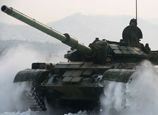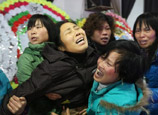
ROME, Jan. 17 (Xinhua) -- Italians will go to the polls to elect their next prime minister in little more than five weeks, in a vote whose importance will resonate far beyond Italy's borders.
Due to a political crisis sparked last year when parliamentary allies of former Prime Minister Silvio Berlusconi walked out during a key confidence vote, the dates for the national vote was moved up a month to Feb. 24-25. Italy will be the first of the European Union's most troubled economies to vote on their leadership this year.
Just 14 months ago, Italy was on the verge of falling victim to the European debt crisis. The yields on Italian bonds were surging to unsustainable levels, as investors feared the country could be forced to default on its debt.
There was widespread speculation that if Italy - like the much smaller economies in Greece, Ireland, and Portugal before it - was forced to turn to the EU for bailout money, the amount it would need would probably be more than the EU could afford. There was a risk that if Italy's economy collapsed, it could take the euro currency with it.
It was in that context that Berlusconi was forced to step down as prime minister, replaced by economist and former European Commissioner Mario Monti.
Monti formed an unelected technocrat government charged with pushing through difficult economic, administrative, and political reforms. Monti's government has done that, pulling Italy back from the brink of fiscal collapse. But the austerity measures he has championed have hit rank-and-file Italians in the pocketbook, eroding the once-strong popular support he enjoyed.
In next month's vote, coalitions headed by Monti and Berlusconi, along with center-left candidate Pier Luigi Bersani, and two other figures - comedian, blogger and activist Beppe Grillo, and former anti-Mafia magistrate Antonio Ingroia - will stand before the electorate of a country at the crossroads. The stakes could hardly be higher.
"The election will decide whether Italy will continue to progress along the path of reforms it has undertaken or whether it will fall back to a situation of growing national debt and social decline," Franco Pavoncello, a frequent political commentator and the president of Rome's John Cabot University.
"This uncertain situation could have negative repercussions for the perceptions by the eurozone and financial markets," Pavoncello said.
Andrea Todi, political risk analyst with investment bankers Hildebrandt and Ferrar, agreed. "It's rare that a single election provides such a clear-cut choice between options and will have such a deep impact on markets," he said.
According to the most recent polls from polling firm Opinioni, Bersani has the support of around 40 percent of those who expressed a preference, followed by around 20 percent each for Berlusconi and Monti, 10 percent for Grillo and 5 percent for Ingroia.
But as many as one in four Italians say they have not yet made up their minds, meaning the numbers could still shift.
















 'Collective children's weddings' held in kindergarten
'Collective children's weddings' held in kindergarten


![]()
